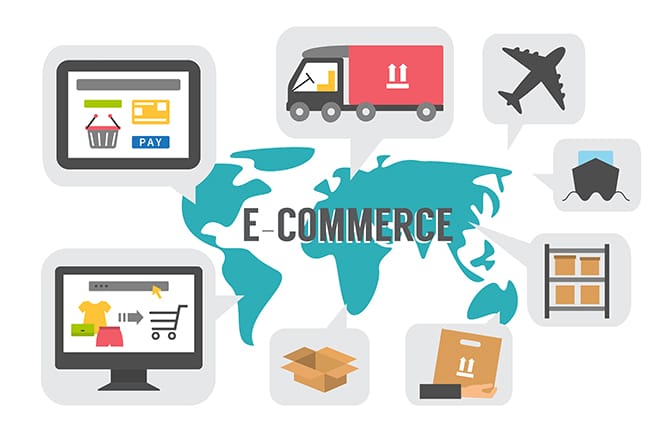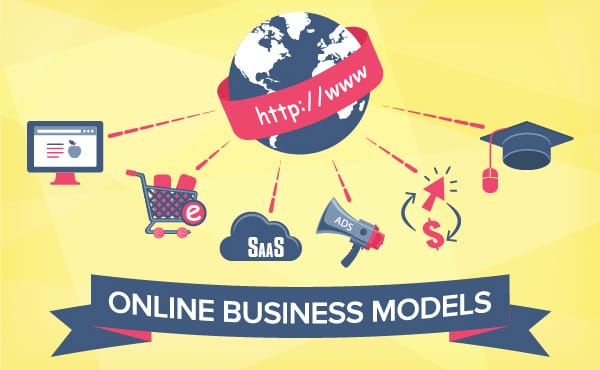Online Business
The digital revolution has opened up countless opportunities for entrepreneurs to start an online business from virtually anywhere in the world. Whether you are looking to start a side hustle or build a full-fledged online business, there are numerous models that cater to different interests and skill sets. In this blog, we’ll explore the top 5 online business models that you can start today with minimal investment and significant potential for growth.
1. E-Commerce Business: Selling Products Online
E-commerce is one of the most popular and proven online business models. It involves selling physical or digital products to customers via an online platform. Whether you’re selling a unique product, dropshipping, or even launching your own brand, e-commerce offers immense potential for success.

How to Start:
- Choose a Niche: The first step is identifying a product or category that resonates with you and has a demand in the market. Popular niches include health and wellness, fashion, electronics, beauty products, and pet supplies.
- Create an Online Store: Platforms like Shopify, WooCommerce, and BigCommerce allow you to set up an online store quickly and with minimal technical expertise. You can also choose between building a custom website or using marketplace platforms like Amazon or Etsy, which have millions of active buyers.
- Product Sourcing: If you don’t have your own products to sell, you can source products via dropshipping, where suppliers ship products directly to customers, or you can choose to manufacture your own products or use wholesale distributors.
- Marketing and SEO: Once your store is set up, you’ll need to drive traffic to it. Invest in SEO, social media marketing, paid ads (Google Ads, Facebook Ads), and influencer partnerships to increase visibility and sales.
Why Choose E-Commerce:
- Low Barrier to Entry: Starting an e-commerce business can be done with minimal investment, especially with dropshipping, where you don’t need to buy inventory upfront.
- Scalability: Once your store is successful, you can expand your product range, target new customer segments, or even expand to international markets.
- Flexibility: You can run your e-commerce business from anywhere in the world, as long as you have a laptop and internet connection.
Potential Challenges:
- Competition: E-commerce can be highly competitive, especially in saturated markets, so it’s crucial to differentiate your product or brand.
- Shipping and Fulfillment: If you’re not using dropshipping, managing inventory and ensuring timely delivery can be a logistical challenge.
2. Affiliate Marketing: Earning Commissions by Promoting Products
Affiliate marketing is an excellent way to make money online by promoting products or services offered by other companies and earning a commission for each sale or action generated through your unique affiliate link. This model is especially popular among bloggers, influencers, and social media marketers.

How to Start:
- Choose a Niche: Select a niche that you are passionate about and where you can find affiliate programs. Popular affiliate niches include technology, health and fitness, lifestyle, and personal finance.
- Join Affiliate Programs: Sign up for affiliate programs that align with your niche. Some popular affiliate networks include Amazon Associates, ClickBank, ShareASale, and CJ Affiliate.
- Create Content: Build a website, blog, YouTube channel, or social media profile where you can create content around the products you’re promoting. Content can be in the form of product reviews, tutorials, blog posts, videos, or even social media posts.
- Drive Traffic: To generate affiliate income, you need to drive traffic to your content. Focus on SEO, content marketing, social media engagement, and email marketing to reach your target audience.
Why Choose Affiliate Marketing:
- Low Startup Costs: You don’t need to create a product or manage inventory. You only need a platform (website, blog, or social media) and the ability to create compelling content.
- Passive Income: Once you’ve set up your affiliate links and optimized your content, you can earn money passively when people click on your affiliate links and make purchases.
- Flexibility: Affiliate marketing allows you to work at your own pace and schedule, and you can do it from anywhere.
Potential Challenges:
- Building Traffic: It can take time to build a following and drive traffic to your content. Consistency in content creation and SEO is key.
- Commission Structure: Affiliate commissions can vary, and sometimes they are low. It’s important to choose high-converting products or services to promote.
3. Online Courses and Coaching: Share Your Expertise
If you have specialized knowledge or skills in a particular area, you can monetize it by creating online courses, offering coaching sessions, or providing consulting services. The demand for online learning has skyrocketed, and this model offers a sustainable way to generate income by helping others learn or improve their skills.

How to Start:
- Identify Your Expertise: Think about your areas of expertise and what people might be willing to pay for. Some popular topics include business development, personal finance, fitness coaching, language learning, and creative skills (e.g., photography, design).
- Create Your Course: Platforms like Teachable, Udemy, and Thinkific make it easy to create and sell online courses. You can create video lessons, PDFs, and quizzes to structure your content effectively.
- Market Your Course: Once your course is ready, promote it via email marketing, webinars, social media, and affiliate marketing. You can also create free content (e.g., blog posts or YouTube videos) to drive traffic to your course.
- Coaching and Consulting: If you prefer one-on-one or group coaching, you can offer personalized services via platforms like Zoom or Skype. You can charge on an hourly basis or offer packages.
Why Choose Online Courses and Coaching:
- High Profit Potential: Online courses and coaching can be very profitable, especially if you target the right audience and have quality content.
- Evergreen Business: Once your course is created, it can generate income for years, with minimal effort required for maintenance or updates.
- Scalability: You can offer multiple courses or coaching services, target a wider audience, and increase your income streams.
Potential Challenges:
- Content Creation: It can take time and effort to create high-quality course content that provides value to your students.
- Marketing: Success depends heavily on how well you market your courses and coaching services. Competition in popular niches can also be intense.
4. Freelancing: Offering Services Online
Freelancing is a versatile online business model where you offer your skills and services to clients in exchange for payment. Freelancers are in demand in various fields such as writing, graphic design, web development, digital marketing, video editing, and more.

How to Start:
- Choose a Niche: Identify the skills you can offer. For instance, if you’re a graphic designer, you can offer logo design, web design, or branding services. If you’re a writer, you can offer content writing, copywriting, or technical writing.
- Create a Portfolio: Build an online portfolio showcasing your previous work or create sample projects if you don’t have experience. Websites like Behance, Dribbble, and personal websites can serve as great portfolio platforms.
- Find Clients: You can find freelance opportunities on platforms like Upwork, Fiverr, Freelancer, and LinkedIn. Networking, cold emailing, or even promoting your services via social media also works well.
- Set Your Pricing: Decide whether to charge per hour or on a project basis. Initially, you may need to offer competitive pricing to attract clients, but over time you can increase your rates as you gain experience and positive reviews.
Why Choose Freelancing:
- Low Startup Costs: You don’t need to invest much upfront. You just need your skills and a computer to start working.
- Flexibility: Freelancing allows you to choose the projects you work on and the clients you work with. You can work from anywhere.
- Scalability: As your business grows, you can increase your rates, take on more projects, or even scale by building a team of freelancers.
Potential Challenges:
- Client Acquisition: It can be challenging to land your first few clients, especially without a network or reputation. Persistence is key.
- Inconsistent Income: As a freelancer, your income may vary from month to month, depending on the number of clients and projects.
5. Subscription Box Service: Curated Products Delivered Regularly
Subscription box services have gained tremendous popularity in recent years. This business model involves delivering curated boxes of products to customers on a regular basis (monthly, quarterly, etc.). Subscription boxes are a great way to tap into niche markets and build a loyal customer base.

How to Start:
- Choose a Niche: Identify a specific niche for your subscription box. Popular options include beauty products, snacks, books, fitness gear, and pet supplies.
- Source Products: Work with suppliers to source products for your box. You can either purchase products wholesale or work directly with manufacturers to create custom items.
- Create a Website: Set up an e-commerce website using platforms like Shopify or Cratejoy, which are tailored for subscription-based businesses. Ensure you have an easy-to-navigate subscription process.
- Marketing and Retention: To attract customers, use social media, influencer marketing, and content marketing. Offer incentives like free trials or discounted first boxes to encourage sign-ups. Retention is key in subscription models, so providing excellent customer service and regularly updating your boxes with new, exciting products will keep subscribers happy.
Why Choose Subscription Box Service:
- Recurring Revenue: The subscription model creates a consistent stream of income, which is beneficial for long-term business sustainability.
- Customer Loyalty: By offering curated, value-filled boxes, you can build a loyal customer base that looks forward to receiving your products regularly.
- Scalability: As your customer base grows, you can increase the frequency of your boxes, expand your product range, or offer premium versions.
Potential Challenges:
- Inventory and Logistics: Managing inventory and timely shipping can be complex and costly, especially when your business grows.
- Customer Retention: Keeping customers engaged and subscribed long-term can be difficult if the products don’t continuously meet their expectations.
Conclusion
The digital age has opened up a wealth of opportunities for entrepreneurs to start successful online businesses. Whether you choose e-commerce, affiliate marketing, online courses, freelancing, or a subscription box service, each model has its unique advantages and challenges. The key to success lies in selecting a business model that aligns with your interests, skills, and goals.
With the right planning, dedication, and marketing strategies, you can turn your online business idea into a profitable venture. Start small, focus on providing value to your customers, and scale gradually as you learn and grow. The online business world is waiting for your innovative ideas!

